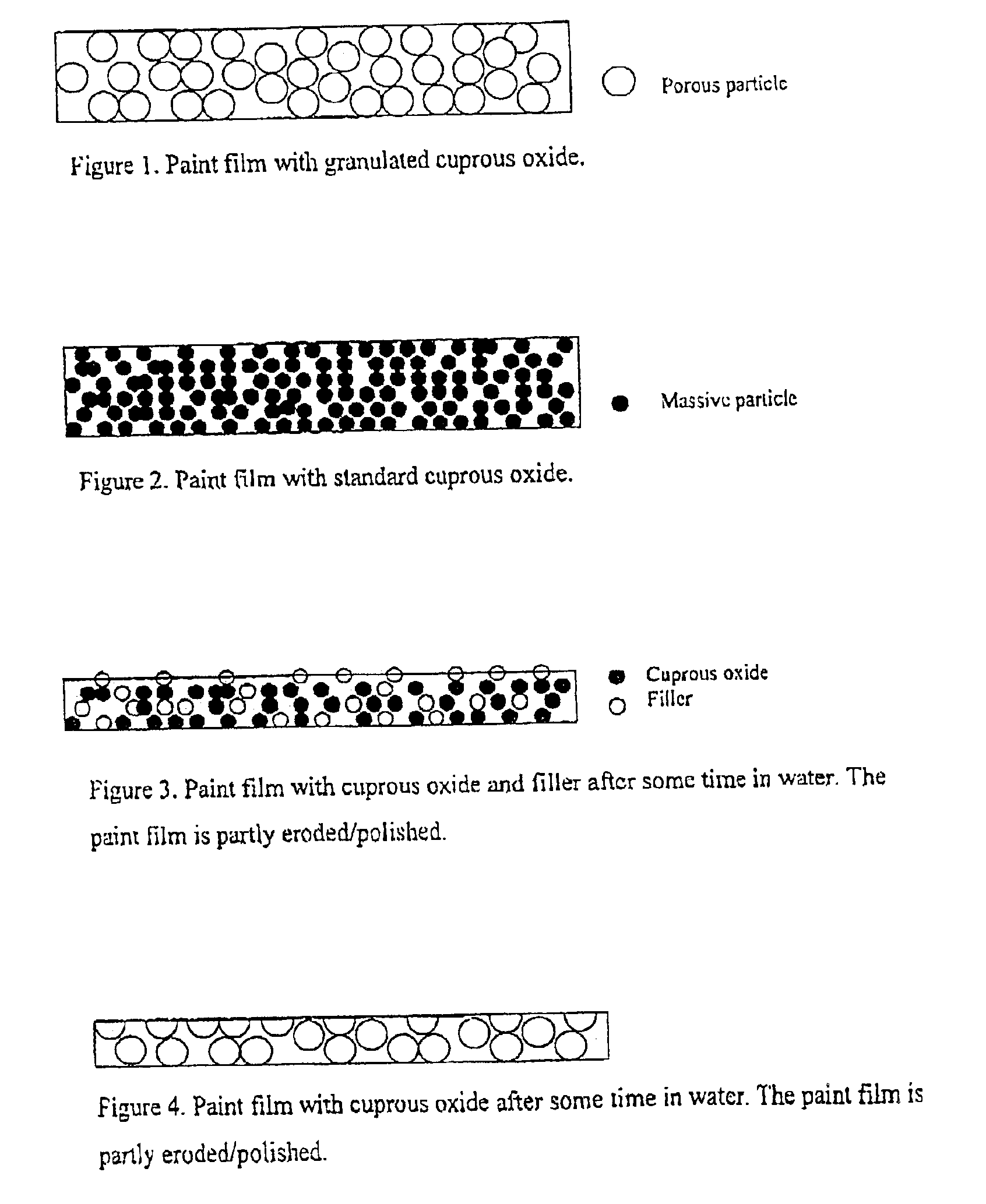Granulated cuprous oxide for antifouling coatings
a technology of antifouling coating and granulated cuprous oxide, which is applied in the field of cucontaining materials, can solve the problems of large lumps of copper oxide, variable particle size and density, and copper plate corrosion problems, and achieve the effect of a smoother surface and better handling properties
- Summary
- Abstract
- Description
- Claims
- Application Information
AI Technical Summary
Benefits of technology
Problems solved by technology
Method used
Image
Examples
example 1
[0039]Granulation of Copper Oxide with PVA as a Binding Agent
[0040]To wet cuprous oxide polyvinyl alcohol was added in the range of 0.3 to 8%, and the mixture was granulated in a spray drier with rotating nozzles. Two types of primary particles were tested; Agro with D50 of 1.2 μm and PG with D50 of 3.5 μm. The water contents of the mixture was in the range of 25 to 55% by weight. Particle sizes, measured before and after granulation, are shown in table 3.
TABLE 3SamplePrimaryWater contentParticle size of granules,identityparticleof slurry (%)PVA (%)D50 (μm)AAgro40531BPG403.746CPG45246DPG503.567EPG55469
example 2
[0041]Colour and Antifouling Properties
[0042]Different versions of granulated cuprous oxide were mixed in paint formulated for use as antifouling.
[0043]The white base formulation consisted of:[0044]800 g (26%) Commercial binder for antifouling paints (Vinyl solution)[0045]1000 g (32%) Ti2O[0046]120 g (4%) Softener[0047]20 g (1%) Gray Vallac[0048]640 g (21%) Colofonium[0049]80 g (3%) Shellsol[0050]460 g (15%) Xylen
[0051]The white base formulation was prepared in a high speed mixer at 3900 rpm for 20 minutes.
[0052]Antifouling paints were prepared by adding 100 g of cuprous oxide to 400 g white base formulation.
[0053]6 different cuprous oxides were tested for colour and antifouling properties. The paints were brought on to steel sheets approximately 20×30 cm and submerged in sea water (the Oslofjord) during one month in summer 2002. The results are listed in table 4 below. Slime means growth of green algae. Shell means growth of mussels.
TABLE 4Paintno.D50, μmGranulation, nameAntifoulin...
PUM
| Property | Measurement | Unit |
|---|---|---|
| Fraction | aaaaa | aaaaa |
| Density | aaaaa | aaaaa |
| Molar mass | aaaaa | aaaaa |
Abstract
Description
Claims
Application Information
 Login to View More
Login to View More - R&D
- Intellectual Property
- Life Sciences
- Materials
- Tech Scout
- Unparalleled Data Quality
- Higher Quality Content
- 60% Fewer Hallucinations
Browse by: Latest US Patents, China's latest patents, Technical Efficacy Thesaurus, Application Domain, Technology Topic, Popular Technical Reports.
© 2025 PatSnap. All rights reserved.Legal|Privacy policy|Modern Slavery Act Transparency Statement|Sitemap|About US| Contact US: help@patsnap.com


